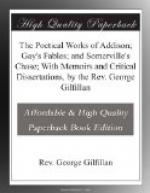Nor naked bosom now nor hands had I.
Lightly I tripped, nor weary as before
Sunk in the sand, but skimmed along the shore;
Till, rising on my wings, I was preferred
To be the chaste Minerva’s virgin bird:
Preferred in vain! I now am in disgrace:
Nyctimene, the owl, enjoys my place.
’On her incestuous life I need not dwell,
(In Lesbos still the horrid tale they tell,)
80
And of her dire amours you must have heard,
For which she now does penance in a bird,
That, conscious of her shame, avoids the light,
And loves the gloomy covering of the night;
The birds, where’er she flutters, scare away
The hooting wretch, and drive her from the day.’
The raven, urged by such impertinence,
Grew passionate, it seems, and took offence,
And cursed the harmless daw; the daw withdrew:
The raven to her injured patron flew,
90
And found him out, and told the fatal truth
Of false Coronis and the favoured youth.
The god was wroth; the colour left his look,
The wreath his head, the harp his hand forsook:
His silver bow and feathered shafts he took,
And lodged an arrow in the tender breast,
That had so often to his own been pressed.
Down fell the wounded nymph, and sadly groaned,
And pulled his arrow reeking from the wound;
And weltering in her blood, thus faintly cried,
100
’Ah, cruel god! though I have justly died,
What has, alas! my unborn infant done,
That he should fall, and two expire in one?
This said, in agonies she fetched her breath.
The god dissolves in pity at her death;
He hates the bird that made her falsehood known,
And hates himself for what himself had done;
The feathered shaft, that sent her to the fates,
And his own hand that sent the shaft he hates.
Fain would he heal the wound, and ease her pain,
110
And tries the compass of his art in vain.
Soon as he saw the lovely nymph expire,
The pile made ready, and the kindling fire,
With sighs and groans her obsequies he kept,
And, if a god could weep, the god had wept.
Her corpse he kissed, and heavenly incense brought,
And solemnised the death himself had wrought.
But, lest his offspring should her fate partake,
Spite of the immortal mixture in his make,
He ripped her womb, and set the child at large,
120
And gave him to the centaur Chiron’s charge:
Then in his fury blacked the raven o’er,
And bid him prate in his white plumes no more.
Lightly I tripped, nor weary as before
Sunk in the sand, but skimmed along the shore;
Till, rising on my wings, I was preferred
To be the chaste Minerva’s virgin bird:
Preferred in vain! I now am in disgrace:
Nyctimene, the owl, enjoys my place.
’On her incestuous life I need not dwell,
(In Lesbos still the horrid tale they tell,)
80
And of her dire amours you must have heard,
For which she now does penance in a bird,
That, conscious of her shame, avoids the light,
And loves the gloomy covering of the night;
The birds, where’er she flutters, scare away
The hooting wretch, and drive her from the day.’
The raven, urged by such impertinence,
Grew passionate, it seems, and took offence,
And cursed the harmless daw; the daw withdrew:
The raven to her injured patron flew,
90
And found him out, and told the fatal truth
Of false Coronis and the favoured youth.
The god was wroth; the colour left his look,
The wreath his head, the harp his hand forsook:
His silver bow and feathered shafts he took,
And lodged an arrow in the tender breast,
That had so often to his own been pressed.
Down fell the wounded nymph, and sadly groaned,
And pulled his arrow reeking from the wound;
And weltering in her blood, thus faintly cried,
100
’Ah, cruel god! though I have justly died,
What has, alas! my unborn infant done,
That he should fall, and two expire in one?
This said, in agonies she fetched her breath.
The god dissolves in pity at her death;
He hates the bird that made her falsehood known,
And hates himself for what himself had done;
The feathered shaft, that sent her to the fates,
And his own hand that sent the shaft he hates.
Fain would he heal the wound, and ease her pain,
110
And tries the compass of his art in vain.
Soon as he saw the lovely nymph expire,
The pile made ready, and the kindling fire,
With sighs and groans her obsequies he kept,
And, if a god could weep, the god had wept.
Her corpse he kissed, and heavenly incense brought,
And solemnised the death himself had wrought.
But, lest his offspring should her fate partake,
Spite of the immortal mixture in his make,
He ripped her womb, and set the child at large,
120
And gave him to the centaur Chiron’s charge:
Then in his fury blacked the raven o’er,
And bid him prate in his white plumes no more.
OCYRRHOE TRANSFORMED TO A MARE.
Old Chiron took the
babe with secret joy,
Proud of the charge of the celestial boy.
His daughter too, whom on the sandy shore
The nymph Chariclo to the centaur bore,
With hair dishevelled on her shoulders
came
To see the child, Ocyrrhoee was her name;




